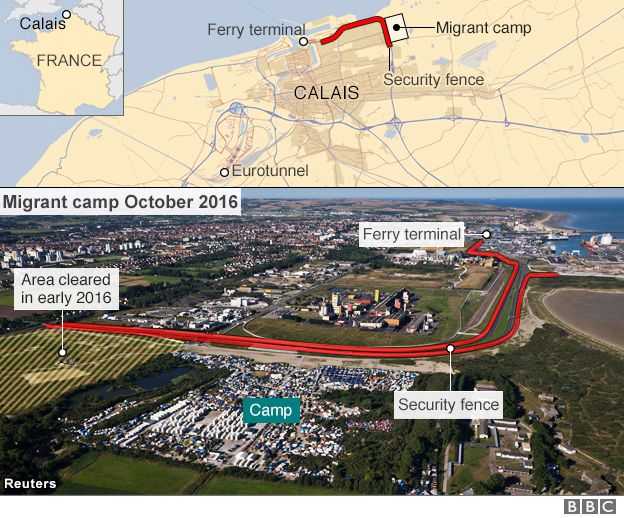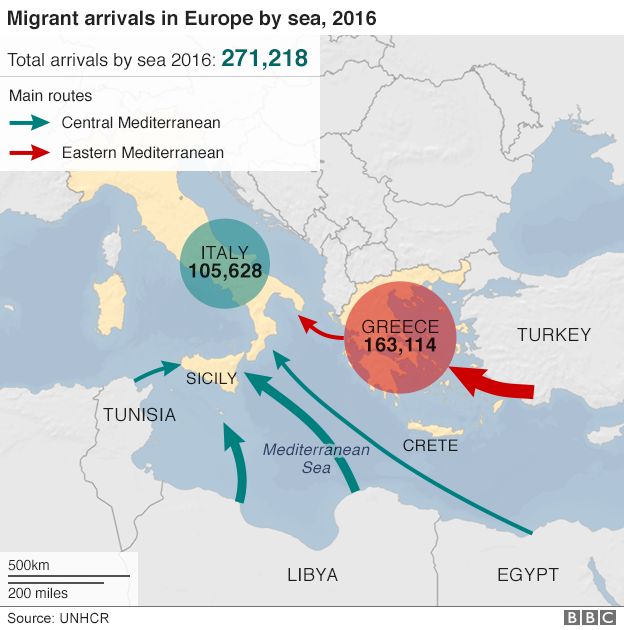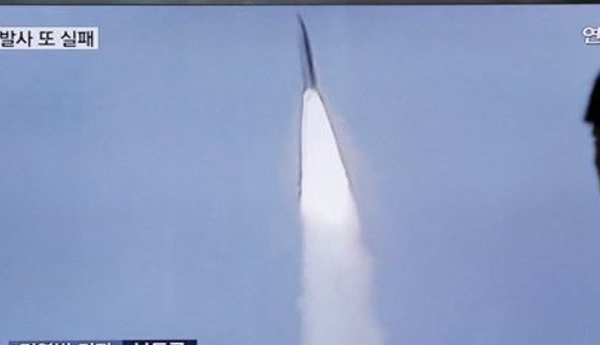More than 1,200 police and officials in France have begun an operation to clear the “Jungle” migrant camp in Calais.
The camp has been housing at least 7,000 people in squalid conditions.
Migrants queued peacefully to be processed, and the first of some 60 coaches that will carry them to refugee centres across France have now left.
There is concern that some migrants will refuse to go because they still want to get to Britain and that weekend clashes with police could be repeated.
The demolition of the camp is expected to take place on Tuesday.
The UK has begun to accept some of the estimated 1,300 unaccompanied children from the camp.
The first group without family ties to the UK has arrived in Britain under the “Dubs amendment” rules, which grant refuge to the most vulnerable.
However, the Home Office said on Monday the transfer process had been paused during the demolition of the Jungle, at the request of the French.
Read more on this story:
-
How are child migrants’ ages checked?
-
The desperate children of the Calais Jungle
-
Migrant children dream of getting to UK – Lyse Doucet
The Jungle migrants are being placed into separate queues to determine who are in families, travelling alone or whether they are in vulnerable categories.
After processing they will leave for various parts of France and be given the opportunity to claim asylum. If they do not, t
Media captionOvernight clashes in the final hours of the ‘Jungle’
There are 7,500 beds being made available in 450 centres across France.
The first coach left less than an hour after processing began – carrying 50 Sudanese to the Burgundy region, AFP reported.
By mid-morning there were long lines at the entrance to the registration centre but French officials said the operation was proceeding well. Parts of the camp were emptying quickly, the BBC’s Gavin Lee reported.
Officials have predicted that some 2,500 people will leave the camp on Monday.
‘My dream is dead’ – at the Jungle with the BBC’s Gavin Lee
 Image copyrightAP
Image copyrightAP
Rue des Garennes links the Jungle camp to the new migrant processing centre, and is a street of suitcases and resignation.
At 05:00, three hours before the clearance operation was due to start, groups of refugees and migrants began to form a queue. Since then, a mass exodus from the camp and hundreds are now lining the road waiting for a coach to take them away.
Towards the back of the queue is Adil from Sudan, carrying two bags, a football and a guitar. “My dream is dead, the people you see here, they are broken. We can’t believe it’s over.”
Inside the camp, aid workers from Care for Calais are moving tent to tent, warning migrants that if they don’t leave, they’ll be arrested. The police presence is large, with many huddled in riot vans, keeping out of the cold, and making the most of the calm.
Children will be housed in the camp’s converted shipping containers while the rest of the Jungle is dismantled.
From Tuesday, heavy machinery will be sent to clear the tents and shelters that have been left behind. The whole operation is expected to take three days.
The French interior ministry said it “does not want to use force but if there are migrants who refuse to leave, or NGOs who cause trouble, the police might be forced to intervene”.
There are reports that British activists from the No Borders group have travelled to the Jungle to try to disrupt the demolition process.
One Afghan migrant at the camp, Karhazi, told the AFP news agency: “They’ll have to force us to leave. We want to go to Britain.”
Those leaving had mixed emotions. One Sudanese man shouted: “Our dream is over.”
However, Abbas, also from Sudan, said: “I feel very happy. I’ve had enough of the Jungle.”
The Jungle has played host to scenes of both squalor and of violence, as migrants, mainly from Africa and the Middle East, attempt to board lorries bound for the UK, clashing with drivers and police in the process.
Why do migrants want to come to the UK?
Most believe there is a better prospect of finding work. Many want to claim asylum, although others want to enter incognito and remain as illegal workers.
The language issue is also important – many speak English but do not have a European language. Some also have relatives in the UK and that is a big draw.
Some are attracted by a belief that there is better housing and education available.
Some commentators believe illegal migrants also perceive Britain as a “soft touch” for benefits and a better place to find “black economy” jobs, although studies do not necessarily back up this view
A UK-funded wall 1km (0.6 miles) long is being built along the main road to the port in an attempt to deter would-be stowaways. The UK government has not confirmed the cost, but it is reported to have contributed about £1.9m (€2.2m).
Work on the wall, which began last month, is due to be finished by the end of the year.
What is the Jungle?
 Image copyrightREUTERSImage captionThe Jungle camp is close to the main road to Calais port
Image copyrightREUTERSImage captionThe Jungle camp is close to the main road to Calais port
-
The Jungle camp is near the port of Calais and close to the 31-mile Channel Tunnel
-
Officially about 7,000 migrants live in the camp. The Help Refugees agency said the final population ahead of its demolition was 8,143
-
The camp was halved in area earlier this year but the population continued to rise, and reports of violence have increased
-
Many migrants attempt to hide themselves in cargo vehicles entering the Channel Tunnel
-
The area has been hit by protests from both locals and truck operators





